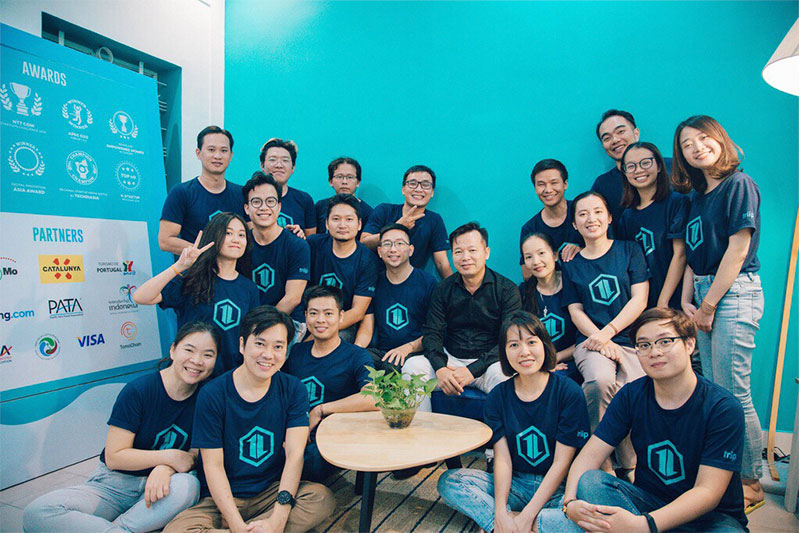Hai Ho, founder of blockchain-powered travel booking app Triip was so focused on bootstrapping his startup that he sold his house to fund it. He talked Hive Life through his story.
It’s no secret that the failure rate for startups is high, standing globally at about 90%. Given those odds, how far would you risk your livelihood in order to succeed? For Hai Ho, who co-founded Triip in 2014, a Singapore-based, all-inclusive travel website that features everything from hotel bookings to local tours, the answer was quite extreme. “I think just like every other founder, I was reckless when I started the company,” says Hai. “But, it wasn’t a blind decision. I saw the feedback of the users, the huge potential and a real need for this service. Back in those days, we were one of the first platforms in the world to offer tours by local people. It became my motivation to go on.”

Whilst the idea for Triip was clear, getting the concept off the ground was much harder work – to the extent that Hai sold his house in 2014 to bootstrap it when they started running out of cash. “For me, it wasn’t risky, but it was painful. My daughter said, ‘Daddy, maybe I’m the only one in the family who will be able to see the old house. My younger brother and sisters will never ever be able to live in this house anymore.’ That really hurt a lot,” he says. But, as it stands, the gamble was worth it – and having secured a huge investment of USD 500,000 from Gobi Partners in 2016, he is now on much firmer ground. Since launching in 2014, Triip has amassed a global user base of 135,000, facilitating over TIIM 2 million (Triip’s own proprietary cryptocurrency) transactions per month, partnering with juggernauts in the travel industry such as Booking.com and blockchain partners in Tomochain.
You might also like 7 Guidelines for Young Entrepreneurs to Turn Failures into Opportunities

The idea for Triip was spurred by an unexpected end to his previous career. “I was working for Misfits Wearables, developing activity trackers, when I was suddenly kicked out without knowing why. I cried at home for a month because I loved their mission,” says Hai. “I was looking for something to build and noticed the travel sector was not up-to-date with the rest of the industry. My co-founder was building volunteer clubs and giving away free tours to travellers going to Vietnam and, even with limited funding, he was ranked number one on TripAdvisor in Ho Chi Minh City. I wanted more people to be able to do local tours and so the idea of Triip came about.” Moving to Singapore, a city known for its strong blockchain regulations and ties to global investors, in 2014, he began putting his vision of a global travel booking firm into reality.
Unlike most of the competition, Triip uses blockchain technology to create a decentralised marketplace focused on rewarding customers who share their travel plans. “Blockchain is good in terms of the decentralising, storing and transparency of the database. However, it can only process one block at a time. We had to relearn a lot of things and build tools and software nobody’s done before with no documentation or anyone to guide us,” he explains of the tech that powers his website. But, it’s in this technology that Triip finds its point of difference. “The biggest difference between Triip and other travel apps is that we allow users to earn money, whereas for other apps, they just allow you to spend,” explains Hai. To be rewarded in the form of TrippMiles (TIIM) – the platform’s proprietary cryptocurrency, all you have to do is book a trip and then provide credible evidence of it, such as hotel bookings. This cryptocurrency can then be used to subsidise future trips or fund other services outside of Triip in the future. It’s this aspect that Hai hopes will inspire loyalty amongst his users. “I think that right now, companies are struggling with the loyalty of customers. Somebody might list a house on Airbnb and the same one on other websites like Booking.com or Agoda. They will use whichever gives them the most money and there’s no lock-up in the ecosystem,” he explains. “But, if the user has something like TriipMiles where the value of the token will go up depending on customer loyalty, it will give them a reason to stay.”

From his bootstrapped start to his pioneering of blockchain in the travel marketplace space, Hai has not taken the easy route. “The biggest lesson I’ve learned is survival. Be a cockroach company. Most of the time, your original idea will be way too ahead of time. The only thing that differentiates a successful from a failed company is the ability to survive.” But it is just this focus on getting to the next day that he credits with his hope in the future. “We survived the first chapter of the company and continued growing until we became profitable. When we started building our blockchain platform in 2017, there was a period called the ‘crypto winter’ where most people said all blockchain projects were scams, but we’ve survived until now. Big players and kings in the market can become obsolete players in the future, but you need to survive to see that happen,” he laughs.
Related Articles
Why Startup Founders Should Build A Personal Ethos, Not A Personal Brand
Sandbox VR: How a Millennial Founder Engineered a USD 79M Gaming Sensation
An Entrepreneur’s Calling: Constant Tedder on Risk, Diversity & Fulfilment





